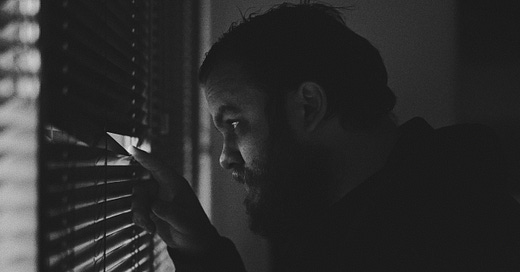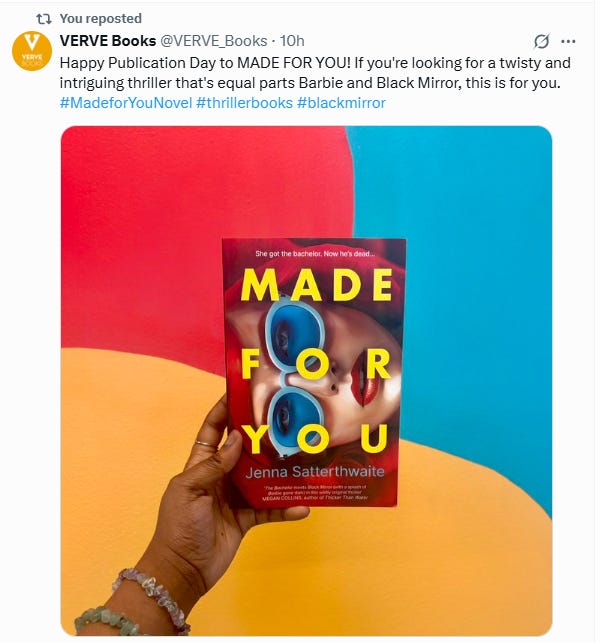Anyone who has been in the writing community for any amount of time has probably heard the wisdom:
“If you’re an author, DO NOT {by all things holy and good} READ YOUR REVIEWS!”
In other words, don’t go creeping on sites like Netgalley, Goodreads, Amazon, Storygraph, etc, looking for what readers have to say about your precious book baby.
One of my authors emailed me recently with a glowing, gorgeous review of her book that brought her to tears, and prefaced the email with something like “I know I’m not supposed to be looking at reviews…”
So, in a way, this post is my response to her and to anyone else who kinda maybe wants to look at reviews (erm, all of us??) and is feeling like maybe that’s the wrong move.
Let’s look at what’s behind this commonly shared advice!
The reasoning behind it goes something like this:
The self-protective angle: You WILL encounter bad reviews, and this may send you into a spiral—so why expose yourself like that?
The temptation to FIGHT: You may be tempted to respond to bad reviews, which is a HUGE no-no. Responding to negative reviews and getting into an argument with a reader is not only just a shi$$y thing to do, but it can send your career into a nosedive. The reasoning goes, if you don’t even look at the reviews, voilà! You will be safely outside the magnetic pull of that temptation.
Writer’s block: Reading bad reviews will feed your insecurity, which might give you writer’s block as you approach your next project.
Staying in your lane: That reader review space doesn’t “belong” to you. In other worse, unlike comments from beta readers and critique partners (which are literally written for your benefit), reviews on sites like Netgalley, Goodreads, Amazon, etc. are for other readers, not for the author.
In my long years in the writing community, I have seen all of these scenarios play out for others. I’ve seen authors freak out and behave badly towards someone who gave them a negative review (eek, pls do not do this). I’ve seen them share a negative review with their fans, who on occasion then descend on the negative reviewer and bully the crap out of them (don’t do this either, I beg!!!!). I’ve seen people get insecure about reviews, and their writing suffers because now that negativity is in their brain.
But there’s another side to it.
That time I read my reviews
As a debut author last year, when my book went up on Netgalley (a platform where you can request digital Advance Reader Copies or ARCs, which are shared before the book’s publication to create traction and buzz for the book leading up to release), it was the first time strangers were going to read any of my work. Ever.
Naturally, I looked.
As reviews started to pop up on Netgalley and Goodreads, I have to admit that I read all of the early ones. I realized at the time that this could be a mistake… but I wanted to find out for myself what my reaction would be.
At first, they were super positive! My very first review was 5 stars. Yippee! In fact, my first 12 reviews were all 4 or 5 stars (I just went back and looked ;). This was an amazing rush! People who owed me nothing, had never met me and never would, were saying they loved my book! The feeling was priceless.
For funsies, here’s my very first reader review for Made for You!
And then, my first 1-star review finally hit (because it’s only a matter of time)…
Okay, not mean by any stretch. But still. One star.
I read it. I read it again. Okay. Was I about to freak out? Spiral? (Yes, I am someone who both has feelings and analyzes them simultaneously… aka I’m a writer 😂)
To my surprise, I found … I didn’t care.
{*poke poke* are there any feelings in there???} {no?} {we good?}
This is perhaps a bit weird, but I got so excited when I realized I didn’t care. I honestly wasn’t sure what my feelings would do, and to look at the bad review and realize it had no negative power over me felt wonderful.
What came next was even more of a surprise! It was feeling of deep gratification. My book wasn’t just reaching people who liked it… but people who didn’t like it! And that, my friends, is simply a larger number of readers. Which eventually translates to more sales—and more royalties (*insert greedy little fingers*). Ever since then, every time I see a bad review, this is where my brain goes— “yay! another reader!”
And if I want to keep doing this author thing, I need all the readers I can get. People who love it. People who hate it. And everyone in between.
We’re all different
To be completely clear, this is in no way a manifesto about how everyone needs to look at their reviews. This was just me discovering how my brain works, and how I respond. A lot of the reason behind my unfazed attitude when I saw this first bad review (and subsequent bad reviews… because that wasn’t the last one!) is my background. I was not (ehem) an overnight success. In fact, I wrote books for 8 1/2 years before selling one, and, between querying and being on sub with six novels, accumulated close to 800 rejections during that time (which I wrote about today for the Verve Books blog to celebrate Made for You releasing in the UK today!). The point is, all those years of rejection forced me to work really hard on reframing and toughening up and not allowing outside voices to make me feel like sh%#. Though I’m not completely immune, I have developed very thick skin.
But that’s not everyone’s story! And it’s not everyone’s personality.
If you’re someone who has a firm rule of never looking at reviews, I APPLAUD YOU. You 100% have more willpower than I do!
On the other hand, I’ve seen posts from writers talking about how they read their reviews for potential valid criticisms, and use them to grow. I don’t use them this way—but dangit, I APPLAUD THAT TOO.
A quick thought on dogmatic advice
I think, in the writing community, it’s easy for us to be extremely dogmatic about how we have chosen to do things—especially once we’ve seen some success. We figure, this worked for me—this must be the right way to do it!
This kind of dogmatic advice is everywhere! You’ve probably heard it once or twice. Here are some examples: write every day. Write messy first drafts. Write early in the morning. And finally, the topic at hand—never look at your reviews.
The thing is, there is an infinite number of ways to “do” this writing and authoring thing, and the fun (and difficulty) of it is that everyone has to learn their own brain, their own process, what works for them and what doesn’t work. I do love it when people share what works for them, because it can inspire me to try a new method that might work for me, too. But in general, there just aren’t rules.
Find what’s good for you—find what’s healthiest, what serves you, what gives to you instead of taking away—and do that.
And maybe, just maybe, for some of you, it might be unapologetically reading your reviews.
(…which now that I’m officially published in the UK for the first time, are again flooding in! Wheeeeee here we go! 🥳🥳🥳)










I couldn't help myself! Needy writer needing validation! I felt very lucky for the most part but my favorite bad review was one person who wrote, "What a waste of a week!" I laughed out loud because he spent a week and read it cover to cover. The biggest takeaway from the process is that your book is not for everyone. Lesson learned! :)
There’s someone in my debut class who made a chrome extension so you can go to your books page and only see the four and five star reviews